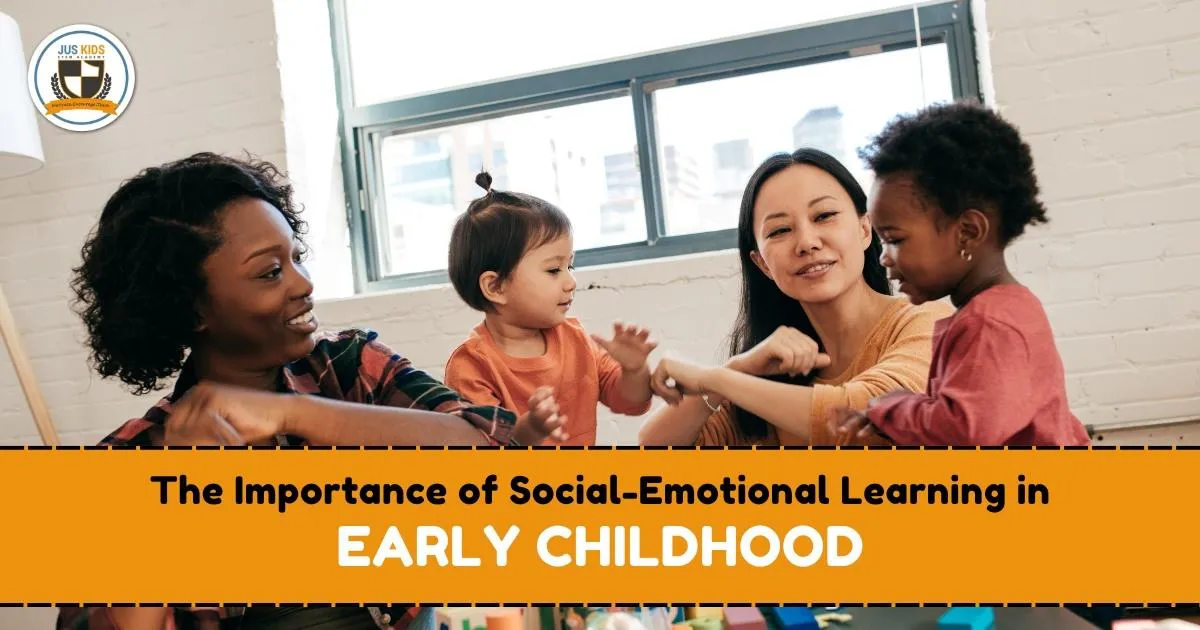
Social Emotional Learning Preschool Benefits for Early Childhood
Think of a preschool where your child learns more than just letters and numbers. They also learn how to deal with frustration, share joy with friends, and build strong relationships. Sounds ideal, right? But the truth is, many preschools focus only on academics and leave emotional growth behind.
Here’s why that matters. Kids need strong social-emotional learning preschool skills just as much as they need to know their ABCs. Without these skills, even the smartest children can struggle with behavior, friendships, and confidence.
That’s where social-emotional learning preschool programs come in. They help children learn to manage emotions, understand others, and feel confident in their daily interactions. In this blog, we’ll explore why SEL is a key part of early childhood education, how it supports preschool behavior development, and why it’s something every parent should look for in a program.
What Is Social Emotional Learning in Preschool?
Social emotional learning in preschool is the process of teaching children how to recognize and understand their feelings, as well as the feelings of others. If you’re wondering about SEL's meaning, it refers to these important skills that are developed through hands-on activities and everyday experiences rather than traditional worksheets. These activities help children build emotional intelligence and learn how to cooperate with others.
Core SEL skills include:
Self-awareness
Emotional regulation
Social interaction
Responsible decision-making
These abilities create a strong foundation for children to succeed academically and maintain healthy relationships throughout their lives.
How Do SEL Activities for Preschool Work?
In practice, social-emotional learning activities for preschool might include role-playing, storytelling, and cooperative games. For example, children might learn how to say, “I’m upset because my tower fell,” instead of throwing a tantrum.
If you’re wondering where to find preschools with this focus, check out programs like JusKids Academy. They emphasize emotional growth alongside academics.
Tip: When choosing a preschool, look for social-emotional learning preschool programs that build emotional skills as well as academic ones.
How Social Emotional Learning Shapes Preschool Behavior Development
Ever noticed how some kids can bounce back quickly from disappointment while others get overwhelmed? Or how some toddlers handle group play smoothly, and others seem to struggle with sharing? That’s SEL in action—or in some cases, the lack of it.
Preschool behavior development is closely linked to a child’s social-emotional skills. Kids who learn to recognize their feelings, express themselves appropriately, and understand others’ perspectives tend to handle challenges better. They’re more cooperative, less prone to tantrums, and can regulate their impulses. These skills create a calm, supportive classroom environment, making learning easier and more enjoyable for everyone.
Without SEL, frustration can quickly turn into conflict. For example, when a child doesn’t know how to say, “I’m upset,” they might resort to yelling or grabbing toys. But with practice in social-emotional learning activities for preschool, they learn alternative ways to cope and communicate.
Social Emotional Learning Activities for Preschool That Work
If you’re curious about how social emotional learning activities for preschool actually look, here are some practical examples you can find in a great preschool program:
Emotion Charades
Kids love to act! Emotion charades is a game where children take turns acting out feelings like happy, sad, angry, or scared while others guess. This helps children understand emotions better and recognize them in themselves and others.
Sharing Circle
Gather the kids in a circle and give each child a chance to talk about their feelings or something that happened during the day. This practice encourages listening, patience, and empathy as they hear others’ stories.
Problem-Solving Role Play
Conflict is normal among preschoolers, but teaching how to solve problems peacefully is key. Role-playing simple scenarios—like sharing a toy or waiting your turn—helps children practice negotiating and expressing their feelings calmly.
Mindfulness and Breathing Exercises
Even little ones benefit from learning how to calm their minds and bodies. Simple breathing exercises or guided mindfulness (like imagining blowing bubbles slowly) can help children manage frustration and stay focused.
Storytelling About Feelings
Reading books that focus on emotions gives kids words to describe how they feel. After the story, ask questions like “How do you think the character felt?” or “What would you do in that situation?” This sparks emotional awareness and thinking.
Cooperative Games
Games that require teamwork, such as building a block tower together or passing a ball, teach cooperation, sharing, and patience. Kids learn how their actions affect others and the value of working as a team.
Quick Tip: Try preschools like JusKids Academy that include daily social-emotional learning activities for preschool to support emotional and intellectual growth.
Why Parents Should Care About Social Emotional Learning Preschool Programs
You might be thinking, “Isn’t academic learning the priority at this age?” It’s a fair question. But here’s the truth: social emotional learning in preschool isn’t just a nice add-on. It’s essential preparation for success in school and life.
Kids who enter kindergarten with strong SEL skills are better prepared to focus, follow instructions, and interact positively with peers and teachers. Research consistently shows that children with strong social-emotional skills perform better academically and have healthier relationships.
Beyond school, SEL helps children handle the ups and downs of life. They develop resilience, empathy, and confidence—qualities that protect mental health and improve long-term well-being. It’s like giving kids an emotional toolkit they can carry with them forever.
If you want your child to thrive not just academically but socially and emotionally, choosing a preschool that values social-emotional learning is key. It’s the kind of education that lasts a lifetime.
How to Support Social Emotional Learning at Home
You don’t have to be a preschool teacher to encourage SEL skills at home. Simple everyday moments can become powerful learning opportunities. Try these ideas:
Label feelings out loud: “I see you’re upset because your toy broke.”
Model healthy emotion management: “I’m frustrated, so I’m taking a deep breath.”
Practice sharing and turn-taking during playdates.
Use books or stories to talk about characters’ emotions and choices.
Praise efforts to express feelings or resolve conflicts peacefully.
Supporting preschool behavior development at home makes SEL feel natural and consistent for your child. It shows them you care about their emotional world as much as their learning milestones.
What Makes a Good Social Emotional Learning Preschool?
Choosing a preschool that prioritizes SEL can be overwhelming. How do you know which programs truly invest in this aspect?
Look for these signs:
A curriculum that includes daily social-emotional learning activities for preschool.
Teachers trained in SEL principles who understand child development deeply.
Classrooms are designed to support emotional regulation, with quiet spaces and calming tools.
Open communication with families about behavior development and emotional growth.
An emphasis on relationship-building among children and between staff and kids.
Programs like those at JusKids Academy focus on nurturing the whole child. They blend academic skills with social-emotional learning in preschool to create balanced, joyful learning environments.
Why SEL in Early Childhood Matters for Society
Beyond individual kids, social-emotional learning preschool programs contribute to healthier communities. Children who learn empathy and cooperation early are more likely to become adults who work well with others, solve conflicts peacefully, and engage positively in society.
SEL builds the foundation for emotional intelligence—a skill as crucial as reading or math in today’s world. Investing in early childhood SEL is investing in a future where people are better equipped to understand themselves and each other.
Wrapping It Up:
Social emotional learning in preschool isn’t just a passing trend; it’s a key part of helping kids grow into confident, caring individuals. When preschools truly focus on SEL, children learn how to manage their emotions, make friends, and do well both in school and in life.
For parents and caregivers, encouraging preschool behavior development through SEL gives your child a head start for success inside and outside the classroom. It’s a gift that builds confidence, resilience, and happiness.
Ready to give your child the best start? Explore preschools that prioritize social-emotional learning and watch your little one flourish.
